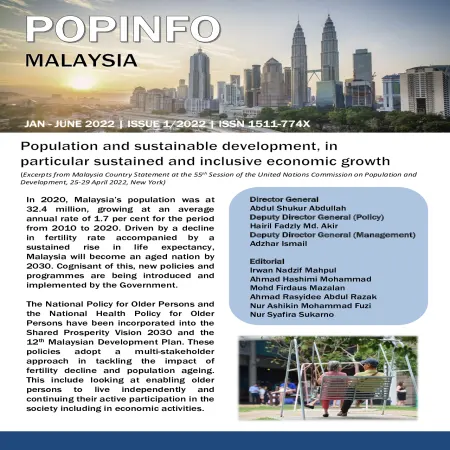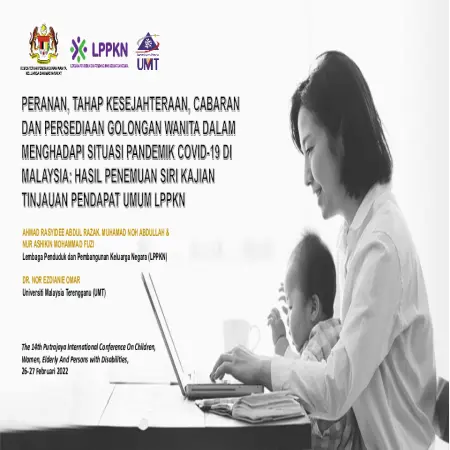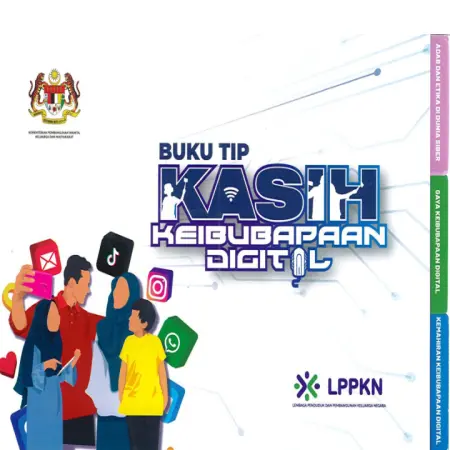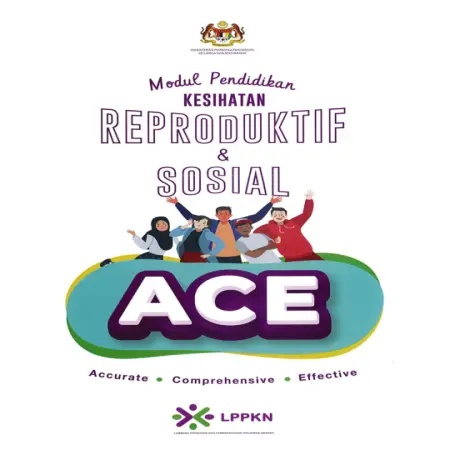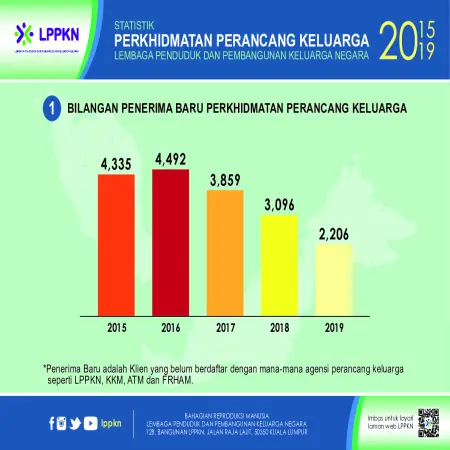Browse by Year
|
|
Autonomy in household decision-making among Malaysia women
Item Type: Thesis
Editor:
Year: 00/06/2022
Abstract: The progress of Malaysian women has significantly improved since 1980, particularly in terms of educational achievement. However, women's labor force participation rate, level of women in decision-making at the household and industry levels, is still below that of men. These instances suggested that there were still obstacles to women's empowerment
in Malaysia, particularly in decision-making. Hence, this study aims to identify factors affecting women's autonomy in household decision-making among married women in Malaysia. Data on women's autonomy in household decision-making were obtained from Fifth Malaysian Population and Family Survey in 2014 and accounted for 2595 married women aged 15-59. Kishor's Conceptual Framework and Three-domains of Women's Empowerment were adopted as a research framework. The study framework consisted of ten exogenous factors and endogenous variables of women's autonomy in household decisions. The household decision-making was divided into eight domains: household expenses, buying a house, making assets, family savings, family holidays, children's discipline, children's education, and woman's career. Each household decision domain had responses of three levels of women's autonomy (not involved, joint and sole participation) and was analyzed individually using the Multinomial Logistics Regression method. The study provides evidence that women's characteristics can restrict the
autonomous power of women in a patriarchal society like Malaysia. All selected factors significantly impacted women's autonomy in at least one decision domain in the household. Women's education was the most substantial factor that positively influenced women's autonomy in all decisions in the household. In contrast, the spousal education gap and participation in the labor force could be a barrier to women's autonomy in the household. The family should be at the forefront of the empowering process as a woman's role in caring for the family's welfare is definite. Despite the continuous efforts to empower women, the study suggested that there is a need for a balance in shaping the positive patriarchal values among the communities, particularly among men. This can be achieved by promoting shared responsibility within a household, and this initiative has the same substantial weightage as a woman's education and economic status.
|
|
|
|
|
|
Socio demographics determinants of contraceptive use among women in Malaysia: logistic regression model
Item Type: Book Section
Editor:
Year: 00/06/2022
Abstract: Family planning could be defined as the ability of individuals and couples to anticipate and achieve their births. There are many types of contraceptive methods that can be used in family planning that could divided into two categories; namely modern and non-modern contraceptives methods. The choice whether to use modern or non-modern methods is said to be related to the socio demographic determinants of contraceptive use among ever married women aged 15-49 in Malaysia. Data used in this study was obtained from a national survey called Fifth Malaysia Population and Family Survey (MPFS-5) which was conducted by the National Population and Family Development Board in 2014. Multi-stage stratified random sampling method was used across all states in Malaysia. A total of 2736 ever married women who use contraception aged 15-49 years old were subjected to a face-to-face interview. The information was obtained on socio demographic characteristics and family planning practise. Data was analysed by using descriptive analysis, Chi-Square analysis and binary logistic regression. Findings of the analysis revealed that amongst five socio-demographic characteristics under study which are stratum, ethnicity, education level, age and income, only three socio-demographic characteristics known as stratum, ethnicity and education level present a significant association to the modern and non-modern contraceptive use among ever married women in Malaysia. In conclusion, the stratum or the location which either from urban or rural areas, the ethnicity which either Malay, other Bumiputera, Chinese or Indian, and the education level which either no education, primary school, secondary school or tertiary school, are the determinants of modern and non-modern contraceptive use among ever married women aged 15-49 in Malaysia
|
|
|
|
|
|
Population and sustainable development, in particular sustained and inclusive economic growth
Item Type: Newsletter
Editor:
Year: 00/05/2022
Abstract: In 2020, Malaysia's population was at 32.4 million, growing at an average annual rate of 1.7 per cent for the period from 2010 to 2020. Driven by a decline in fertility rate accompanied by a sustained rise in life expectancy. Malaysia will become an aged nation by 2030.
|
|
|
|
|
|
The 55th session of the Commission on Population and Development United Nations, New York, 25-29 April 2022
Item Type: Country Statement
Editor:
Year: 00/04/2022
Abstract: Malaysia’s socio-economic development has been significant in transforming our economy from a low income to an upper-middle-income status. We have achieved significant progress in eradicating poverty and narrowing inequalities. However, the COVID-19 crisis has resulted in vulnerable households falling into poverty and hardship.
|
|
|
|
|
|
Peranan, tahap kesejahteraan, cabaran dan persediaan golongan wanita dalam menghadapi situasi pandemik Covid-19 di Malaysia: Hasil penemuan siri kajian tinjauan pendapat umum LPPKN
Item Type: Conference or Workshop Item
Editor:
Year: 26/02/2022
Abstract: Since the outbreak of the COVID-19 epidemic in the country since early 2020, the economy and community life have been severely affected. The increase in the number of daily cases as a result of several new waves of COVID-19 has also prompted the Government to implement a series of Movement Control Orders (MCO) nationwide. As a result, society, especially women, are seen to be increasingly stressed due to the loss of sources of income, limited involvement in outdoor activities and problems in balancing between work and family hours. Aware of this situation, the National Population and Family Development Board (NPFDB) has taken the initiative to conduct a series of public opinion polls throughout 2020 and 2021. This study aims to explore the role, level of well -being, challenges and preparation of women in facing pandemic situations. COVID-19 in Malaysia. This study is an online survey study. The findings of this study are a reflection of the current situation of society and family institutions in the face of the new wave of COVID-19. The results of a survey that focused on women showed that women were more affected than men. Although the level of well -being of women in the country is still at a satisfactory level, various issues and challenges are faced especially for those who are married. Issues of family management, children's education at home and more flexible working hours should be highlighted for consideration by the Government. It is hoped that various initiatives and development plans related to women can be planned as well as further strengthen the existing policies towards achieving the aspirations of the Malaysian Family. In general, this paper contributes to the knowledge related to the current situation of women in the face of new normative life. While in particular, this paper contributes to knowledge related to the role, well-being, challenges and preparation of women in facing the COVID-19 pandemic situation.
|
|
|
|
|
|
Modul Latihan Jurulatih SMARTSTART 2.0 "Pra Perkahwinan"
Item Type: Module
Editor:
Year: 00/01/2022
Abstract: Introduction:-
SMARTSTART 2.0 Pre-Marriage Training the Trainers Trainer Module is a new module that has been processed more neat and organized as a result of creative ideas through the compilation of contents and activities based on observations related to the latest issues that often being the cause of divorce. This module is a standard reference and guideline specially prepared for the use of trainers to facilitate the learning process, teaching and guide the preparation of programme materials. Through this module, it is hoped that it can provide positive benefits especially to individuals or couples who want to get married or who are planning to start a family in order to be more physically, mentally, emotionally, spiritually and financially prepared.
Objectives:
To provide knowledge and skills to the participants about preparations towards marriage.
Program Duration:
2 day program
Target Participants:
Individuals or couples who want/plan to get married.
Interactive Content:
Promising difference through learning and delivery methods. Full involvement of participants through skills training and group activities.
|
|
|
|
|
|
Modul Kasih Keibubapaan Digital
Item Type: Module
Editor:
Year: 00/01/2022
Abstract: Since the country was struck by the Covid-19 pandemic, the new normal has led to increased reliance across all layers of society on devices and the internet for various daily activities such as work, learning, shopping, banking, entertainment, and various other matters. The Internet User Survey (IUS) 2020 by the Malaysian Communications and Multimedia Commission (MCMC) found:
i. Internet users in Malaysia increased to 88.7% in 2020 compared to 87.4% in 2018; and
ii. 50% of internet users spent 5 to 12 hours per day surfing the internet in 2020.
In addition to various potential threats that could target children in the cyber world, the IUS 2020 report found that the level of awareness among parents regarding cyber safety is decreasing. The findings of the report indicate:
i. The level of parental control awareness regarding children's internet usage declined from 62.4% in 2018 to 53.3% in 2020;
ii. 62.5% of parents do not use safety control software for the devices used by their children because they are unaware of such applications; and
iii. On average, parents are unable to specify in detail the safety measures needed to protect their children in the cyber world.
Furthermore, Cyber Security Malaysia's Study on the Standard of Cyber Safety Awareness Among School Students and Parents 2021-2022 revealed that the increase in online activities has led to an increased risk of cyber safety for students. According to the report, internet addiction, lack of digital citizenship awareness, and less effective parental control have contributed to increased cyber safety risks for the younger generation.
Recognizing that digital parenting issues indeed pose challenges and pressures on today's parenting duties, LPPKN has taken the initiative to develop the Digital Parenting KASIH Program using the allocation from the Covid-19 Fund (KWC-19) under the Mental Health Advocacy Initiative of the Ministry of Women, Family, and Community Development in 2022. This program aims to empower parents with the knowledge and skills needed to manage the challenges of children in the current digital generation.
The main objectives of the Digital Parenting KASIH Program are:
i. To instill positive values and ethics in the cyber realm;
ii. To enhance parents' understanding of digital challenges; and
iii. To improve parent’s skills in monitoring children’s usage of digital applications.
|
|
|
|
|
|
Buku Tip Kasih Keibubapaan Digital
Item Type: Book
Editor:
Year: 00/01/2022
Abstract: The DIGITAL PARENTING TIPS booklet are published with the aim of enhancing parents and guardians knowledge and skills in managing the increasing challenges of digital parenting, which are seen to exert more pressure on parenting duties in this digital era.
The collection of tips in this booklet complements the Digital Parenting KASIH Module developed by LPPKN, intended to strengthen family institutions in this country.
We hope that the tips provided will serve as references and guidance for parents and guardians in effectively managing their family’s digital life. Consequently, children can be guided to become ethical and responsible digital users.
|
|
|
|
|
|
Modul Pendidikan Kesihatan Reproduktif dan Sosial ACE (Accurate, Comprehensive, Effective)
Item Type: Module
Editor:
Year: 00/01/2022
Abstract: LPPKN published an intervention module called Module ACE – Accurate, Comprehensive and Effective on 2021 as a product from The Youth Intervention Study: Best Practices for Youth Intervention Programs that was carried out in 2016. This module is suitable to be used for adolescents age 10 to 24 years old.
The ACE module covers comprehensive reproductive health and sexuality education which includes legislation on sexual violence, gender equality and human trafficking. The module has been implemented on targeted groups consist of youths and peer educators, and proven to expand their knowledge on reproductive health. The activities from the module are delivered using pedagogy method that encourage on two-way interaction and responsiveness.
|
|
|
|
|
|
Statistik data perkhidmatan perancang keluarga LPPKN tahun 2015-2019
Item Type: Report
Editor:
Year: 00/00/2022
Abstract: National Population and Family Development Board Malaysia (NPFDB) have prepared a statistic report on family planning services at the NPFDB level according to the number of new recipients, type of contraceptive, state, age group, ethnicity, strata and employment status for 2015 to 2019. This report only consist new recipients, which is new clients who have not registered with any of family planning agency such as NPFDB, Ministry of Health (MOH), Malaysian Armed Forces (ATM) and Federation of Reproductive Health Associations Malaysia (FRHAM). The breakdown of statistic report by type of contraceptive have included implant, injection, condom, pill, intrauterine device and non-modern methods. Meanwhile, the breakdown of family planning data by age have covered the range of 15 years to 49 years. The breakdown of data by ethnicity also have included Malay, Chinese, Indian, other bumiputera and other ethnicities. These statistic data were also have provided by strata (urban and rural), employment status (employed and unemployed) and education breakdown including college/ university, secondary school, primary school and non formal education.
|
|
|
|







